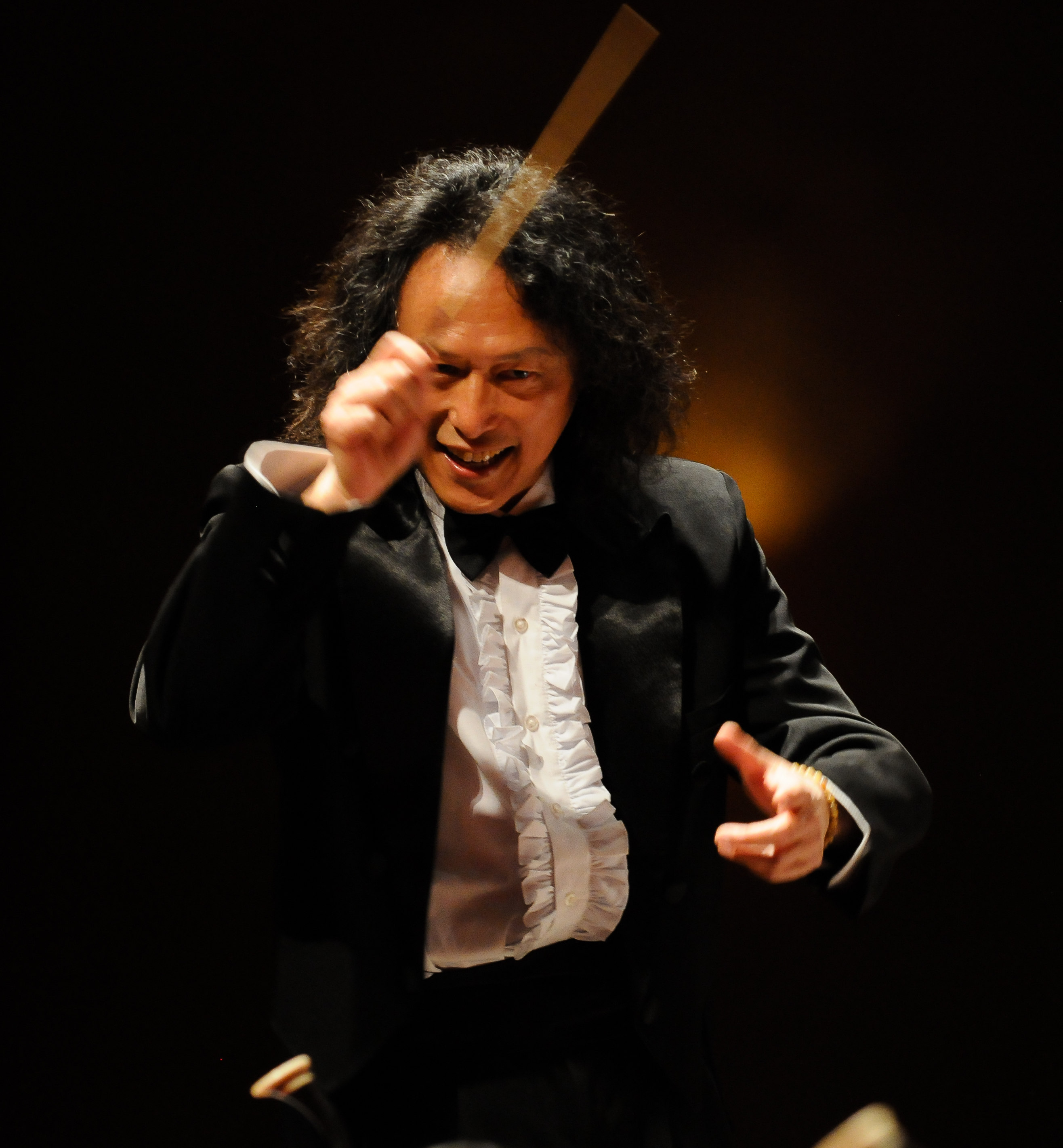Artistic Director
Gordon Lee
 Founder of Aimusic.us (2013), Firebird Youth Chinese Orchestra (FYCO, 2000), and Eastern Music Center (1994)
Founder of Aimusic.us (2013), Firebird Youth Chinese Orchestra (FYCO, 2000), and Eastern Music Center (1994)
Born in Beijing with a Sichuan origin, Lee learned the Erhu from his mother when he was 5. At the age of 16, he went to a farm located in the border between Russia and China, working in a Peking Opera troupe as a composer, conductor, and Pipa player. In 1973, Lee studied Chinese music at Sichuan Conservatory of Music under Professor Chen Jilue, the founder and conductor of the first professional Chinese orchestra in China in 1930-40’s. As his mentor for 16 years, Professor Chen has been the most influential scholar to Gordon.
Mostly by private lessons, Lee studied traditional Chinese operatic music, composition, conducting, and Chinese instruments. His teachers include––
- ZHANG Qi: artistic director in Wuhan Opera Theater Symphony); Dr. Tikey Zes: composition professor in San Jose State University
- XU Xin: conducting professor in Central Conservatory of Music, the chair of Conductor Association of China
- HE Wei: Chinese operatic music researcher in Central Traditional Opera Institute
- HONG Xiansong: Chuanju percussion professor in Sichuan Vocation College of Art
- HAN Shude (1973), WU Junsheng (1976-79), WANG Fandi (1981-84): Pipa professors in Sichuan and China Conservatory of Music
In 1978, Lee entered China Pingju Opera Theater in Beijing as a Pipa player. In 1988, he passed all the undergraduate courses in the Chinese major of the Beijing Higher Education Self-study Examination. The graduation thesis “Li Jieren’s Still Water Waves and French Naturalist Novels” (thesis advisor: Lan Dizhi, the Chinese Language and Literature Department of Beijing Normal University lecturer who became the professor of Tsinghua University later) was published in the Modern Literature Research Quarterly. Afterward he came to the United States for a continual study, and obtained a master’s degree in Theater Arts from San Jose State University in 1995. His “Perceiving Ingmar Bergman’s The Silence through I-Ching” (thesis advisor Dr. Karl Toepfer, later the Dean of the College of Humanities and the Arts) won the outstanding thesis award at the University, and has been displayed in the San Jose Public Library and Bergman Estate in Sweden. Before coming to the US, Gordon had accumulated rich experiences from playing in 5,000 performances and watching 10,000 live shows.
Since 1994, Lee has been teaching Chinese music in San Francisco Bay Area. Starting in 2002, he was the Chinese music instructor at San Jose City College for 11 years. As a director, Gordon leads Aimusic as one of a few Asian-American organizations in the nation to be awarded by government arts agencies. Individually, he has received an “Investing in the Artists” grant award from Center for Cultural Innovation in 2008, a “Composer Assistant Program” award from American Music Center in 2009, and an “Arts Leadership Award” from Arts Council Silicon Valley in 2010.
Away from utilitarianism, Gordon adheres to the artistic essence of joy. He believes that playing develops intuition and creativity in the state of equality, trust, relaxation, and inspiration. Lee trains students’ critical thinking, independency, team spirit, and leadership by following this natural law. He also focuses on––
- Carrying on the cultural tradition by learning folksongs, folk music, regional opera, musical storytelling, and Buddhist, Taoist, and court music that have been circulated for thousands of years in China.
- Emphasizing scientific performing techniques, guiding students to pursue a crystal clear tone quality with highly relaxed movements.
- Encouraging youngsters to love music and play joyfully in a group. They can extend this joyful sense and manner to their study, exam, work, and daily life.
- Pursuing harmony from individual to people, and from less to more, bringing happiness of music to family, community, and society.
- Promoting natural sound and nurturing musician and audience’s keen sense of hearing, not use electroacoustic amplification in most occasions.
- Exploring Chinese orchestra instrumentation in line with the principles of oriental aesthetics, and constantly practicing in his composition and orchestra training.
- Writing WeChat articles in Chinese to explain the essence of art, the importance of hearing, the benefits of learning orchestral instruments, and the aesthetic function of heritage Chinese music. The following are some links:
- The Yin-Yang Nature of Traditional Chinese Music (International symposium speech video)
- Do Online Instrumental Music lessons Work?
- Xian Di Pipa Pu 250th Anniversary Celebration Modern-day World Premiere of the Music for the Sanxian Dizi & Pipa
- Play for Good
- Hearing and Taste
- Choosing What to Learn
- Chinese Music vs Western Music
- What Summer Class Cannot Do
Gordon wrote a number of instrumental music for Chinese and mixed Chinese-Western orchestra. His compositions include––
- Chinese Orchestra The Tiger Mountain Suite Adapted from the 1965 Chinese orchestra version Peking Opera (2023)
- Chinese Orchestra Bluegrass Blackberry Blossom (2022)
- Pipa Sanxian Duet Tiger Lily from the Xian Di Pipa Music in 1770 (2020)
- Chinese Orchestra Emperors Follow the Universe –– Qing Dynasty Court Music Selection 1742-1760 (2019)
- Chinese Orchestra Melody of Sichuan (2018)
- Chinese orchestra Selections from Red Detachment of Women (2013)
- Chinese orchestra On the Docks Suite (2011)
- Symphonic Suite for Erhu, Pipa, & Sheng Young Impressions of the Old City (Commissioned by Symphony Silicon Valley 2009)
- Sheng Ensemble Songshan Shaolin Temple (2008)
- Chinese orchestra Scenic Seasons Suite (2007)
- Chinese Orchestra Suite The Winchester House (2006)
- Ruan Ensemble Tipsy (2005)
- Chinese orchestra General’s Command (2004)
- French Horn and Plucked Instruments Oliver Tree (2003)
- Chinese Orchestra Bright Future (2001)
- Chinese orchestra Mulan Ballad (1998)
- Chinese Ensemble Embroidering a Gold Plaque (1977)
- Choir 7.21 School Song (1976)
- Dance Music New Herdsmen (1975)
- Playlet in Shandong Opera style Six Old Men Learning Mao’s Work (1974)
- Dance Music Construction Site (1973)
Featured TV Reports––
- NBC Bay Area A Classic Chinese Music Collection in 1814 hosted by Robert Handa (Jan 29, 2019)
- KTSF news Shanghai Theatre Academy joins Aimusic Festival (May 5, 2017)
- NBC Bay Area Asian Pacific Americans hosted by Robert Handa (Oct 14, 2014)
- CCTV news FYCO Visiting Taiwan (Jul 5, 2013)
- KQED Spark Firebird Youth Chinese Orchestra Performing the Legacy (May 6, 2009)
- KTSF news FYCO Musician in White House (Jan 15, 2004)
- Phoenix TV & CCTV Pole to Pole Expedition (Jun 24, 2002)
Composition
- Symphonic Suite for Erhu, Pipa & Sheng Young Impressions of the Old City (Year: 2010, Symphony Silicon Valley, Concert hall capacity: 1,122 seats)
- The Mercury News cover page feature story Composer Gordon Lee evokes his youth in Beijing in premiere with Silicon Valley Symphony (Jan 4, 2010)
- KTSF news report by Jessie Liang, Jan 7, 2010
- Talk Tonight hosted by Jiayu Jeng (Jan 8, 2010)
- Phoenix North America Successful “Young Impressions of the Old City” Premiere (Feb 4, 2010)
- Wind and percussion playlet from Chuanju Opera Mice Wedding (Year: 2008, Concert hall capacity: 1,122 seats)
- Rain at the Humble Administrator’s Garden - The theme is derived from Pingtan, a music storytelling form in Shanghai area (Year: 2103, Hsinchu City Chinese Orchestra and FYCO, Theater capacity: 1,092 seats)
- Yueju Opera in Chinese Orchestra - Lotus Lantern excerpt A Poetic Tribute (Year: 2008, Concert hall capacity: 1,122 seats)
- Peking Opera in Chinese Orchestra On the Docks Suite (Year: 2012, Concert hall capacity: 1,122 seats)
- Peking Opera Suite The Tiger Mountain –– Adapted from the 1965 Chinese ensemble version of modern Peking Opera by Shanghai Peking Opera Theatre (Year: 2024, Concert hall capacity: 569 seats)
- Poetic Singing Song of the Lute (Year: 2011, Theater capacity: 340 seats)
- Dance Moon Aloft (Year: 2011, Theater capacity: 340 seats)
- ABC live American National Anthem on NBA (Feb 12, 2013, Oakland Arena capacity: 19,596 seats with microphones)
- World Journal Rockets vs. Warriors, FYCO Plays the National Anthem (Feb 7, 2013)
- Sing Tao Chinese Radio FYCO Plays National Anthem on NBA (Mandarin) (Feb 13, 2013)
- Huangmei Capriccio (Year: 2008, Concert hall capacity: 1,122 seats)
- Pingju Opera Liu Qiao Er excerpt Delivering Threads by the Little Bridge (Year: 2010, Concert hall capacity: 1,122)
- Kunqu Opera Peony Pavilion excerpt Tracing the Dream by HOU Shuang (Year 2016, Concert hall capacity: 1,122 seats)
- Peking Opera Farewell My Concubine selection by GUAN Yi (Year 2008, Concert hall capacity: 1,122 seats)
- Kunqu Opera The Thousand Mile Escort by HOU Shaokui and HOU Shuang (Year 2016, Concert hall capacity: 1,122 seats)
- The Yueqin in Peking Opera White Snake excerpt Reunion at the Broken Bridge by WANG Lifang, SUN Jihai, GUAN Yi (Year 2016, Concert hall capacity: 1,122 seats)
- The first time drummer in the Hebei Wind & Percussion Grazing the Donkey (Guanzi Prof. HU Zhihou from Central Conservatory of Music, Dec 10, 2017, Theater capacity: 340 seats)
- The Bangu in Chuanju Interlude Music Melody of Sichuan (Year: 2018, Concert hall capacity: 1,122 seats)
- The Pipa in Reference Collection of String Music (1814) Gyrfalcon (Sanxian Prof. TAN Longjian from Central Conservatory of Music, Guzheng Prof. LIN Ling from China Conservatory of Music, and Erhu instructor HE Churong, May 4, 2019, Concert hall capacity: 1,122 seats)
